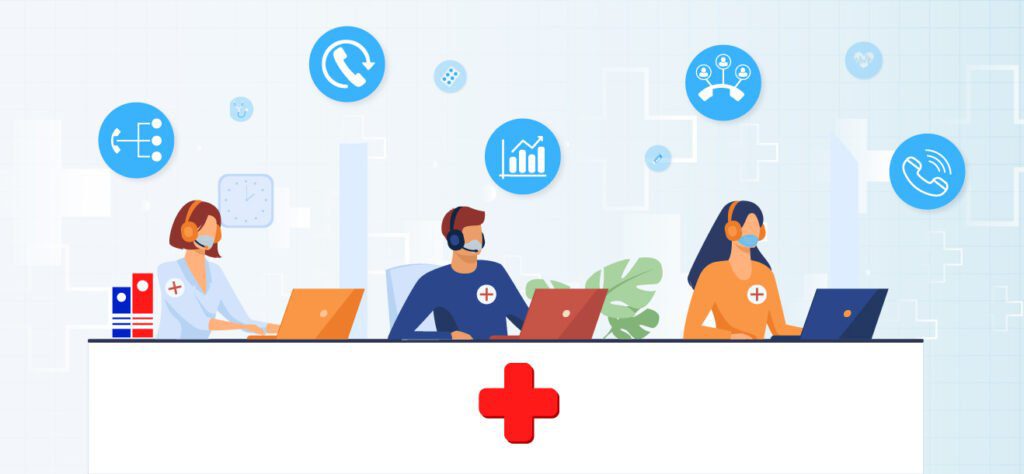Introduction
In the fast-paced world of healthcare, effective communication is critical. Medical call centers are critical in handling patient interactions, scheduling appointments, and providing critical information. Many healthcare organizations are increasingly considering outsourcing their medical call center services to skilled third-party vendors. In this blog post, we will look at the concept of a medical call center and why it can be a game changer for healthcare providers.
What is a Medical Call Center?
A medical call center is a centralized communication hub that handles incoming and outgoing calls for healthcare services. These facilities are manned with trained specialists who can handle a variety of jobs, including:
Booking Appointments:
Patients can plan, reschedule, or cancel appointments by calling the center, making it convenient for both patients and healthcare providers.
Patient Concerns:
For patients seeking information on healthcare services, facilities, or general medical advice, medical call centers serve as a credible source of information.
Emergency Assistance:
In severe situations, medical call centers can quickly dispatch emergency services, ensuring that patients in need receive immediate care.
Follow-up after Discharge:
Post-discharge follow-up calls can be made by medical call centers to check on patients’ well-being and provide any necessary advice.
Why Should You Outsource a Medical Call Centre?
Healthcare providers can benefit from outsourcing a medical call center in a variety of ways, including:

Improved Patient Care
Healthcare providers can ensure their patients receive exceptional care around the clock by outsourcing call center services. Trained employees can handle patient inquiries quickly and accurately, leading to higher patient satisfaction.
Enhanced Efficiency
Outsourced call centers feature more efficient operations and improved call management solutions. Healthcare practitioners can concentrate on core medical operations while the call center manages appointments and other administrative responsibilities.
Savings on expenses
Creating an in-house medical call center might be expensive. Healthcare providers can save money on infrastructure, technology, and manpower via outsourcing. It also eliminates the need for ongoing training and software updates, lowering expenses even further.
Multilingual Assistance
Outsourced medical contact centers frequently provide multilingual help, allowing them to break through language barriers and serve a more diversified patient group. This feature has the potential to substantially improve communication and the patient experience.
Flexibility
As healthcare facilities expand, their call center needs may change. Outsourced call centers may simply scale up or down in response to demand, maintaining consistent service regardless of volume.
24/7 Availability
Medical call centers are typically open 24 hours a day, seven days a week, to provide patients with round-the-clock assistance. This continuous availability ensures that people can get medical help whenever they need it.
Access to Specialized Expertise
Outsourced call centers frequently employ highly experienced employees with specialized healthcare knowledge. This knowledge improves the quality of patient contacts, resulting in more accurate information and improved patient outcomes.
Focus on Core Competencies
Healthcare providers can focus on their core strengths and devote more time to patient care and medical innovations by outsourcing non-essential tasks such as call center operations.
Data Analytics and Insights
Many outsourced call centers offer comprehensive statistics and insights into call numbers, patient queries, and response times. This information can assist healthcare professionals in identifying areas for improvement and optimizing their services.
Regulatory Compliance
Reputable outsourced call centers understand healthcare rules and guarantee HIPAA and other data protection standards are met, protecting patient information.
Must Read: Embracing Live Chat Outsourcing – A Vital Necessity
Conclusion
Outsourcing a medical call center provides numerous advantages to healthcare providers, including improved patient care, cost savings, and increased efficiency. Healthcare institutions may maintain seamless communication, improve patient experiences, and focus on their core objective of providing high-quality medical services by working with a reputable call center provider. Accept the benefits of outsourcing and propel your healthcare facility to new heights of excellence. The decision to outsource a medical contact center can be a game changer for both the healthcare provider and the people they serve.
Frequently Asked Questions (FAQs)
Q1: What services do medical call centers provide?
A medical contact center offers a variety of services, such as appointment scheduling, patient inquiries, emergency help, and post-discharge follow-ups. It functions as a centralized communication center for medical facilities.
Q2: How can outsourcing a medical call center improve patient care?
A2: By outsourcing a medical call center, healthcare providers can ensure round-the-clock availability, prompt handling of patient inquiries, and access to specialized expertise. This leads to improved patient satisfaction and overall better patient care.
Q3: Are outsourced medical call centers HIPAA compliant?
Reputably outsourced medical call centers adhere to HIPAA regulations and maintain strict data security protocols to safeguard patient information. They prioritize patient confidentiality and data protection.
Q4: Can an outsourced medical call center handle multilingual support?
Yes, many outsourced medical call centers offer multilingual support, enabling effective communication with diverse patient populations and ensuring language barriers are overcome.
Q5: How does outsourcing a medical call center reduce costs for healthcare providers?
Outsourcing eliminates the need for healthcare providers to invest in infrastructure, technology, and continuous training for call center staff. This reduction in overhead costs translates to significant savings.
